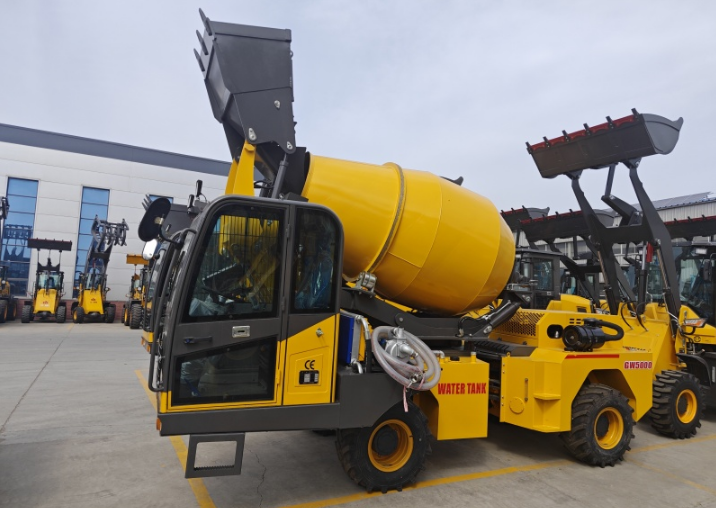Self-Loading Concrete Mixer or Volumetric Mixer?
When it comes to the construction industry, selecting the right equipment for mixing and transporting concrete is crucial for efficiency and quality. Two popular choices are self-loading concrete mixers and volumetric mixers. Each has its unique advantages and applications, making it essential to understand their differences and determine which one best fits your project needs. This article will delve into the features, benefits, and ideal uses for both types of mixers, helping you make an informed decision.
Understanding Self-Loading Concrete Mixers
A self-loading concrete mixer is a versatile machine that can load, mix, and transport concrete on-site. Equipped with an automatic loading system, this type of mixer can scoop raw materials, such as sand, gravel, cement, and water, into its drum, where they are mixed together. The machine then transports the freshly mixed concrete directly to the construction site, allowing for immediate use.
Key Features of Self-Loading Concrete Mixers
1. Automated Loading System:
Self-loading mixers are designed to automatically load raw materials, reducing manual labor and increasing efficiency.
2. On-Site Mixing Capability:
These machines produce concrete on-demand, eliminating delays associated with transporting pre-mixed concrete.
3. Mobility:
With their compact design and built-in wheels, self-loading mixers can navigate tight spaces and rough terrains, making them ideal for job sites with limited access.
4. Versatility:
Self-loading mixers can handle various types of concrete mixes, making them suitable for a wide range of construction projects.
Benefits of Self-Loading Concrete Mixers
- Cost Efficiency:
By reducing transportation costs and labor needs, self-loading mixers can save contractors significant money.
- Quality Control:
Operators can adjust the mix proportions based on the specific requirements of the project, ensuring consistent quality.
- Time Savings:
The ability to mix concrete on-site allows for quick production, helping construction teams stay on schedule.
Understanding Volumetric Mixers
Volumetric mixers, also known as mobile concrete mixers, carry all the necessary ingredients to produce concrete and mix them on-site. Unlike self-loading mixers, volumetric mixers have separate compartments for each ingredient, allowing precise control over the proportions used in the mix.
Key Features of Volumetric Mixers
1. Separate Ingredient Compartments:
Volumetric mixers store cement, aggregates, water, and additives in different compartments, ensuring accurate measurements for each batch.
2. Batch Mixing Capability:
These mixers can produce concrete in defined volumes, enabling contractors to adjust the mix based on immediate project requirements.
3. Real-Time Adjustments:
Operators can modify the mix proportions as needed, allowing for flexibility in responding to changing project specifications.
Benefits of Volumetric Mixers
- Precision:
The ability to measure ingredients accurately results in consistent concrete quality, which is crucial for large-scale projects.
- Flexibility:
Contractors can easily adapt the concrete mix based on specific job requirements, making volumetric mixers suitable for various applications.
- Reduced Waste:
By producing only the amount of concrete needed for a specific job, volumetric mixers minimize waste and reduce costs.
Comparing Self-Loading and Volumetric Mixers
While both self-loading concrete mixers and volumetric mixers offer unique advantages, the choice between them largely depends on the scale and type of your construction project. Here’s a quick comparison:
Feature | Self-Loading Concrete Mixer | Volumetric Mixer |
Loading Method | Automated loading of raw materials | Separate compartments for precise ingredient storage |
Mixing Capability | On-site mixing of concrete | Batch mixing with precise volume measurements |
Mobility | Highly mobile, ideal for tight spaces | Mobile but typically requires a larger footprint |
Best For | Small to medium projects | Larger projects requiring high precision |
Conclusion
Choosing between a self-loading concrete mixer and a volumetric mixer depends on your specific project needs and goals. If you're working on smaller projects that require immediate concrete availability and flexibility, a self-loading concrete mixer may be the better option. On the other hand, if your project demands precise measurements and high-quality consistency, especially in larger applications, a volumetric mixer could be the ideal choice.
Ultimately, understanding the unique features and benefits of each type of mixer will empower you to make an informed decision that enhances productivity and efficiency on your job site. If you have any questions or need assistance selecting the right equipment for your project, don’t hesitate to contact us. As a reliable supplier, we are here to help you find the perfect solution to meet your concrete mixing needs.














